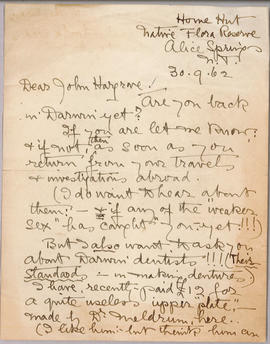Identity area
Reference code
Title
Date(s)
- 1956-1974 (Creation)
Level of description
Collection
Extent and medium
2 folders (63 letters)
Context area
Name of creator
Biographical history
Olive Muriel Pink (17 March 1884 – 6 July 1975) was an Australian botanical illustrator, anthropologist, gardener, and activist for Aboriginal rights. for more information see Australian Dictionary of Biography http://adb.anu.edu.au/biography/pink-olive-muriel-11428
Name of creator
Biographical history
John Charles Hargrave AO, MBE, MD, DSc(Hon), MBBS, FRACS, DTMH (1931-2020), plastic and reconstructive surgeon, was born in Perth and grew up in Western Australia. After attending Medical School at the University of Adelaide, he went to the Northern Territory in 1956. Hargrave was the medical officer with the 1957 Lake McKay expedition which contacted some of the last remaining groups of the nomadic Pintubi people of the Western Desert who had no previous contact with colonists. He noted their robust good health and advised against any relocation or interference.
Posted initially to Alice Springs as a ‘Native Surveys Medical Officer’, this involved examining all the Aboriginal people on various settlements and missions in Central Australia, looking for specific ailments – particularly Tuberculosis, Trachoma, Hookworm, Leprosy Otitis media, Anaemia, and Hypertension – and relating it to the environmental conditions under which the people lived. He realised he knew nothing about Aboriginal Australia and contacted the celebrated anthropologist Olive Pink, who agreed to meet him.
During his early surveys, he noted that leprosy was a significant health issue. It had been brought into the Territory in the 1880s by gold miners and labourers, spreading disproportionately into Aboriginal communities. Leprosy patients, including children as young as four years of age, were forcibly removed from their families and incarcerated, usually for the rest of their lives – first on Mud Island, then on Channel Island in the Darwin harbour. In 1956, the East Arm Leprosarium on the mainland, staffed by Catholic Sisters from the order of Daughters of the Sacred Heart, replaced the island leprosarium. Hargrave became its medical superintendent. He brought a respectful, collaborative approach to the care of Aboriginal patients, who had grown so afraid of Commonwealth institutional powers that they would often hide their symptoms to avoid separation from their families.
All his life he had an easy, respectful, engaging manner with all he interacted with - regardless of race, status, or language. He dedicated himself to learning common phrases of all the languages of all the people he worked with, both in the NT, and later in Indonesia and Timor. He was a compulsive teacher, mentor, collaborator, and encourager. Hargrave identified persons of promise, ability and goodwill and freely shared his knowledge and skills with no regard to hierarchy. He thus developed a cadre of Aboriginal health workers in the NT who could diagnose, treat, perform physiotherapy, operate, suture (including microsurgery), and dress wounds. He started the first formal training programs for Aboriginal health workers. Nurses were empowered to adopt high level skills and functioned as equals on the team. He learnt to fly, to facilitate his movement around the Territory. During a series of sabbaticals and with a WHO scholarship, Hargrave visited leprosy centres throughout South East Asia, studying and learning techniques and management. On his return to Darwin, with no other surgical training and in the face of administrative opposition, he established a reconstructive surgical program at the leprosarium from scratch. By 1982, leprosy was in marked decline in the Territory and the East Arm Leprosarium was closed. While continuing in Leprosy control, he was appointed as the inaugural NT Director of Aboriginal Health, and later started the incipient Communicable Disease Unit. Simultaneously, he was also appointed as a specialist hand surgeon to the Darwin Hospital and provided electro-neuro and myographic services to the NT.
In the late 1980s, he developed a locally supported, sustainable reconstructive surgical program in Timor and Flores. He again identified and mentored local clinicians of ability and promise, sought out and established working relationships, functional health services, collaborated with locally based organisations, and learnt local languages. His trips to and focus on Indonesia and Timor Leste grew in the 1990s and continued after his retirement from the NT Health Service in 1995. Surprising many, John built a beautiful house overlooking the Derwent, and after more than 40 years in the tropics, moved to Tasmania in the late 1990s, by flying down in his twin-engine plane. He continued trips to the north, introducing and mentoring other surgeons and clinicians. Hargrave died in Hobart in 2020, aged 89.
Immediate source of acquisition or transfer
Donated by Gillian Ward
Content and structure area
Scope and content
Collection consists of letters written by Olive Pink to John Hargrave during the years 1956 to 1974. Written from Home Hut, Native Flora Reserve, Alice Springs. John Hargrave addressed variously as Dr Hargrave, Sir, Grandson, Boy, Nungari, John Hargrave, Yabulla/Yabbula/Yabbulla.
Appraisal, destruction and scheduling
Accruals
System of arrangement
Chronological
Conditions of access and use area
Conditions governing access
Conditions governing reproduction
This material is made available for personal research and study purposes under the University of Tasmania Standard Copyright Licence. For any further use permission should be obtained from the copyright owners. For assistance please contact Special.Collections@utas.edu.au
When reusing this material, please cite the reference number and provide the following acknowledgement:
“Courtesy of the UTAS Library Special & Rare Collections”
Language of material
- English
Script of material
Language and script notes
Physical characteristics and technical requirements
Finding aids
Existence and location of originals
Existence and location of copies
Related units of description
Alternative identifier(s)
Access points
Subject access points
Place access points
Name access points
Genre access points
Description identifier
Institution identifier
Rules and/or conventions used
Status
Level of detail
Dates of creation revision deletion
WR 22.11.21


